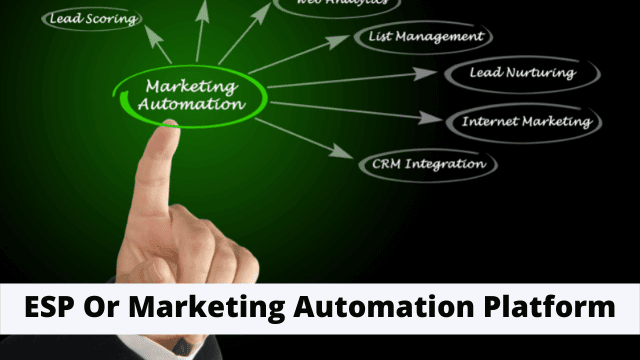ESP Or Marketing Automation Platform, Even though marketing automation systems are becoming more widely used, many marketers are still uncertain how they vary from email service providers—and which will best suit their needs.
Marketing automation and email marketing software start from different places, with significantly varied prices and levels of complexity.
However, there is a clear trend toward marketing automation, with commentators stating that over 75% of the world’s biggest firms are already utilizing some form of marketing automation technologies this year.
While determining if marketing automation or ESP is the best option for your company, a better question to ask is: What is the difference between the two and I will help you find an answer as a Salesforce marketing cloud email specialist:
What’s Exactly The Difference Between A Marketing Automation And An ESP
There’s a frequent misperception that email service providers and marketing automation systems are more alike than they are distinct.
But, unfortunately, while both software systems can send bulk marketing and sales emails, that’s where the similarities end.
Email service providers, often known as “email marketing software platforms,” are a type of software that allows marketers to produce and deliver emails to prospects and consumers.
The most advanced platforms have some list segmentation capabilities, but their primary purpose is to send those emails – generally without much behavioral tracking or audience targeting.
A firm with a dedicated sales force is more likely to profit from a marketing automation solution than a shop that mostly sells through eCommerce.
This is the case because marketing automation software is meant to intelligently nurture leads until they can be passed on to a sales team.
When enough of the proper sorts of interactions between the prospect and the marketing team have happened, these systems use lead scoring to automatically send leads to the sales team.
In contrast, ESPs are mostly utilized for direct conversion. Emails may be automated, and a prospect’s email message may change depending on whether he looked at men’s trousers or women’s jewelry on a retailer’s website.
Emails may also be used for branding and information, but this is generally done as part of marketing and, therefore, a sales process that will result in a direct conversion without the need for a salesperson in the end.
Pros of using an ESP
An ESP tool provides you with a centralized interface to communicate with all your prospects, leads, and customers over emails at minimal costs.
Unlike other channels, you don’t need to make recurring payments for contacting the leads. Instead, you can have a single window access to start one-on-one communications.
It also enables you to come up with sophisticated automation workflows that can help you with both marketing and transactional messages.
You can use ESPs to communicate with your list, where you can improvise your communications with every message you send. Thus, you can stay relevant to the evolving customer behavior when ESPs are concerned.
You may send basic text, images, or attach files, depending on what best matches your core message. Thus, emails give you greater control over your brand’s expressiveness.
Cons of using an ESP
The following are some of the potential issues with ESPs:
No doubt, it is easy to get started with ESPs but as you scale up, they become increasingly complicated. As your mailing list grows, the number of segments, email templates and their versions required increase manifolds. Coping up with analytics and manpower requirements also become points of concern.
In most cases, the ESP tools are focused either on marketing or on transactional messages with the other one being available but not up to the mark. ESP Or Marketing Automation Platform With an ESP, you can not track your prospect’s activity beyond email.
We can say that when it comes to email marketing, ESP tools don’t have many disadvantages, just that you need to select the right one based on the features they specialize in.
Pros of using a Marketing Automation Platform
The following are just a few of the advantages of marketing automation.
Marketers may use automation to cut down on the time they spend on manual activities. Email follow-ups and content dissemination, for example.
Marketing employees become more efficient as a result of automation solutions, allowing them to focus on high-impact activities like creating marketing campaigns. Improving operational efficiency might result in a higher return on investment.
Marketing automation may assist you in scaling campaign operations in response to client growth. As the number of conversions rises, automating marketing operations makes it easier to reach and track all consumers.
Cons of using a Marketing Automation Platform
ESP Or Marketing Automation Platform With marketing automation technologies, not everything shines. As a result, it might be difficult for businesses to put them in place at times. Before implementing marketing automation technologies, examine the following factors.
You must plan ahead of time for the benefits that the program may bring. To develop an effective Mar Tech stack, you need to assess your processes and analyze your goals.
When thinking about automating your marketing operations, it’s important to assess what procedures can and can’t be automated.
If your processes have flaws or inefficiencies, the new software won’t fix them overnight. You should make sure that the procedures aren’t fragmented and that teams are working together.
While the marketing automation platform can help simplify processes, it cannot address more serious problems. Before deploying solutions, you should analyze and refine the operating procedures.
Summing Up
Which choice is the best for you? It all starts with your objectives. Though it may sound diplomatic but it depends on what you are looking for in terms of end results and your resources.
If you have a sales team and a longer purchase cycle, marketing automation is the ideal answer for you. If not, you should consider which sort of email service provider is best for your business.
Author: Kevin George is the head of marketing at Email Uplers, that specializes in crafting Professional Email Templates, PSD to Email conversion, and Mailchimp Templates.
Kevin loves gadgets, bikes & jazz, and he breathes email marketing. He enjoys sharing his insights and thoughts on email marketing best practices on email marketing blog.

Hello, My name is Shari & I am a writer for the ‘Outlook AppIns’ blog. I’m a CSIT graduate & I’ve been working in the IT industry for 3 years.
